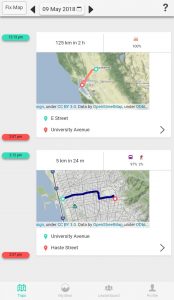e-mission platform two-day workshop
August 20, 2018 — August 21, 2018
K. SHANKARI – UC BERKELEY
WANT TO UNDERSTAND HOW HUMANS TRAVEL AND WHY? WANT TO SEE IF YOU CAN INFLUENCE TRAVEL BEHAVIOR AND INFLUENCE CLIMATE CHANGE?
August 21 | 9:00 am – 5:00 pm in 117 Dwinelle Hall (Level D)
The Global Metropolitan Studies Program and the Division of Data Science are pleased to sponsor a workshop on a platform for collecting and analyzing such data. The workshop will introduce participants to e-mission, an open-source platform for collecting human travel data. The course is intended for students and researchers across a variety of fields. Attend this workshop to learn open source techniques, details about the e-mission platform, and brainstorm about enhancements to the system.
Please RSVP here if you are planning to attend. Lunch will be provided. Remote attendance with asynchronous Q&A is also supported with pre-registration. In order to avoid spammers from taking over the Q&A, participation will be restricted to people who have registered. So please register even if participating remotely.
K. Shankari is a Doctoral Candidate at the Department of Electrical Engineering and Computer Science (EECS) and the developer of the e-mission platform.
WORKSHOP AGENDA
- Aug. 20th, morning session: background material: Help project leads become with basic CS/open source concepts so that they can point students in the right direction – e.g. what is a branch? what is a pull request?
- Aug. 20th evening session: e-mission overview: Help everybody become more familiar with the features of e-mission. what is the e-mission architecture? how do I change the UI? what does the data look like? hands-on setup of end-to-end system.
- Aug. 21st morning session: improving the setup: how can we lower barriers to entry for deploying the system and analyzing the data? Hopefully, this will include improvements to documentation and scripts using your new-found OSS skills
- Aug. 21st evening session: roadmap ahead: what is the long-term direction that we want the project to go in? what are the potential improvements, how do we prioritize them, and who gets to tackle them?


